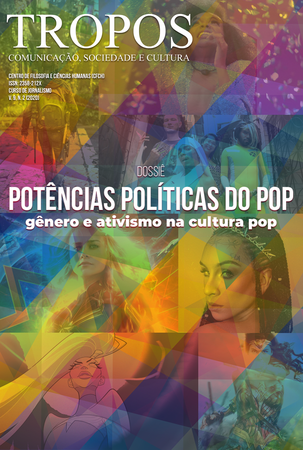CULTURA POPULAR NEGRA: DECOLONIALIDADE NO RAP E EM PRODUÇÕES AUDIOVISUAIS
Keywords:
Race, Decoloniality, Pop Culture, Rap, AudiovisualAbstract
The objective of this article is to identify the decolonial discourse in pop culture through rap in addition to series and movies whose approach involves racial themes. Understanding the historical processes as a field of disputes and repositioning movements, we search in the productions of “black popular culture” the elements that identify the concrete experiences of black women and men, in order to understand how the dislocations of power structures happen through cultural practices. As method, we used the speech analysis to discuss the rap lyrics of three different artists: the rappers BK’, Emicida and Kendrick Lamar; as well as audiovisual productions directed and starred by black people: the movie Black Panther and the series Atlanta and Insecure. The ideas of modernity, race, language and decolonization are worked based on the considerations of Paul Gilroy (2001), Stuart Hall (2003), Achille Mbembe (2018), Frantz Fanon (2008) and Grada Kilomba (2019), among other authors. Using the criticism of coloniality and the “cultural studies”, we understand the art as a narrative of the experience of the black people, that brings the historicity of subjects made invisible by hegemonic narratives and recognizes their potentialities, languages, corporealities, aesthetics and expressiveness, mainly through culture. As a result, we conclude that racializing daily questions and bringing them into cultural production is fundamental, since artistic practices reflect the racial relations of their time and seek to connect with people who go through the same situations, creating a network of identity constructions in around that culture.
Downloads
References
BERNARDINO-COSTA, Joaze; GROSFOGUEL, Ramón. Decolonialidade e perspectiva negra. In: Revista Sociedade e Estado, Brasília, vol. 31, nº 1, pp. 15-24, janeiro-abril, 2016.
BK’. Adeus. In: BK’. Antes dos Gigantes Chegarem: Pirâmide Perdida, 2017. 1 CD. Faixa 1.
___. Novo Poder. In: BK’. Gigantes: Pirâmide Perdida, 2018. 1 CD. Faixa 1.
___. Porcentos. In: BK’. Gigantes: Pirâmide Perdida, 2018. 1 CD. Faixa 2.
___. Vivos. In: BK’. Gigantes: Pirâmide Perdida, 2018. 1 CD. Faixa 8.
BLUES, Baco Exu do. Faixa Preta. In: OldMonkey: [s.n.], 2016. 1 EP. Faixa 3.
BOURDIEU, Pierre; WACQUANT, Loïc. Sobre as Artimanhas da Razão Imperialista. In: Estudos Afro-Asiáticos, Rio de Janeiro, vol. 24, nº 1, pp. 15-33, 2002.
BUTLER, Judith. Introdução. In: BUTLER, Judith. Corpos em aliança e a política das ruas. Rio de Janeiro: Civilização Brasileira, 2018.
CARNEIRO, Sueli. A construção do outro como não-ser como fundamento do ser. 2005. 340 f. Tese (Doutorado em Educação) – Programa de Pós-Graduação em Educação, Universidade de São Paulo, São Paulo.
COLAÇO, Thais Luzia. Novas perspectivas para a antropologia jurídica na América Latina: o direito e o pensamento decolonial. Florianópolis: Fundação Boiteux, 2012.
DOMINGUES, Petrônio. Cultura popular: as construções de um conceito na produção historiográfica. In: História, São Paulo, vol. 30, nº 2, pp. 401-419, agosto-dezembro, 2011.
EMICIDA. Intro (é necessário voltar ao começo). In: Pra quem já Mordeu um Cachorro por Comida, até que eu Cheguei Longe…: Laboratório Fantasma, 2009. 1 CD. Faixa 1.
________. Hey, Rap!. In: Pra quem já Mordeu um Cachorro por Comida, até que eu Cheguei Longe…: Laboratório Fantasma, 2009. 1 CD. Faixa 21.
ELNIÑO, Thiago. Atlântico (Calunga Grande). In: Pedras, Flechas, Lanças, Espadas e Espelhos: [s.n.]. 2019. 1 CD. Faixa 1.
FANON, Frantz. Os condenados da terra. Rio de Janeiro: Civilização Brasileira, 1968.
_____________. Pele negra, máscaras brancas. Salvador: EDUFBA, 2008.
FAIRCLOUGH, Norman. Discurso e Mudança Social. 2ª ed. Brasília: Editora UnB, 2019.
FOUCAULT, Michel. O poder e a norma. In: KATZ, Chaim Samuel (Org.). Psicanálise, poder e desejo. Rio de Janeiro: Ibrapsi, 1979.
GILROY, Paul. O Atlântico negro: modernidade e dupla consciência. Rio de Janeiro: Universidade Cândido Mendes, Centro de Estudos Afro-Asiáticos, 2001.
HALL, Stuart. A identidade cultural na pós-modernidade. Rio de Janeiro: DP&A, 2006.
____________. Da diáspora: identidades e mediações culturais. Belo Horizonte: Editora UFMG, 2003.
INSECURE. 3 Arts Entertainment, Home Box Office (HBO), Estados Unidos da América, 2016 – presente.
KILOMBA, Grada. Memórias da plantação - episódios de racismo cotidiano. Rio de Janeiro: Cobogó, 2019.
LAMAR, Kendrick. M.A.Ad city. In: Good kid, m.A.A.d city: Top Dawg/Aftermath/Interscope, 2012. 1 CD. Faixa 8.
__________________. Momma. In: To Pimp a Butterfly: Top Dawg/Aftermath/Interscope, 2015. 1 CD. Faixa 9.
MBEMBE, Achille. Crítica da razão negra. São Paulo: n-1 edições, 2018.
________________. Necropolítica: biopoder, soberania, estado de exceção, política da morte. São Paulo: n-1 edições, 2018.
MUNANGA, Kabengele. Negritude: usos e sentidos. São Paulo: Autêntica, 2009.
PANTERA Negra. Direção: Ryan Coogler, Produção: Kevin Feige. Marvel Studios, Estados Unidos da América, 2018.
QUIJANO, Aníbal. Colonialidade do poder, eurocentrismo e América Latina. In: LANDER, Edgardo (Org.). A colonialidade do saber: eurocentrismo e ciências sociais. Perspectivas latino-americanas. Buenos Aires: CLACSO, 2005.
SCOTT, Joan. Gênero: uma categoria útil de análise histórica. In: Educação & Realidade, Porto Alegre, vol. 20, nº 2, pp. 71-99, julho-dezembro, 1995.
SOUZA, Neusa Santos. Tornar-se negro ou As vicissitudes da identidade do negro em ascensão social. Rio de Janeiro: Edições Graal, 1983.
Downloads
Published
How to Cite
Issue
Section
License
Transferência de direitos autorais:
Declaro que após aprovado para publicação a Revista Tropos editada pela Universidade Federal do Acre (UFAC), passará a ter os direitos autorais do trabalho, que se tornarão propriedade exclusiva da Revista, sendo permitida a reprodução total ou parcial desde que devidamente referenciada.

